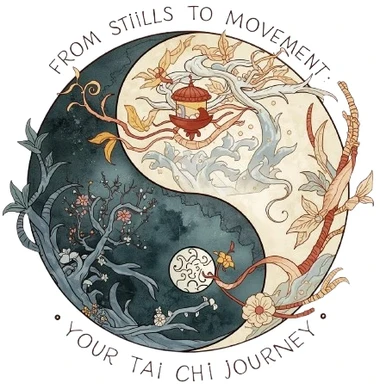No, tai chi isn't generally harder than yoga for beginners—actually, many find tai chi easier to start with. Tai chi involves gentle, flowing movements that don't require the same flexibility or strength demands as many yoga poses. I spent months trying to master basic yoga poses before switching to tai chi, and the difference in my initial frustration levels was remarkable.
When I first rolled out my yoga mat, I struggled with simple poses like Downward Dog. My hamstrings screamed, my wrists ached, and I needed blocks and straps just to approximate the positions shown in class. Yoga has a definite learning curve, especially if you're not naturally flexible. Tai chi, on the other hand, met me where I was. I could perform the movements within my current range of motion without props or special equipment.
After researching both practices deeply, I found the article "Yoga or Tai Chi? The Best Choice for Your Golden Years" on this site incredibly helpful. It explains that tai chi is often easier for absolute beginners due to its slow, simple movements and lack of equipment requirements. The continuous weight-shifting in tai chi builds balance naturally, while yoga requires holding static positions that can be challenging if your stability isn't great yet.
That said, both practices have their challenges. Tai chi's difficulty lies in mastering the subtle coordination of movements and understanding the internal energy flow. It's deceptively simple-looking but requires patience to refine. Yoga's challenge comes from physical demands—deep stretches, balance poses, and sometimes complex transitions between positions.
What makes a practice "hard" really depends on your body and goals. If you have stiff joints or balance concerns, tai chi's gentle flow might feel easier. If you're naturally flexible but struggle with coordination, yoga might come more naturally to you. Both become more challenging as you advance, though in different ways.
I've noticed my tai chi practice has dramatically improved my balance in just three months—something I never achieved in years of sporadic yoga practice. The movements transfer directly to daily life: getting up from chairs, walking on uneven surfaces, even carrying groceries feels more stable now.
What's your experience been? Did you find one practice easier to pick up than the other? I'd love to hear how others have navigated this choice, especially if you've tried both!
When I first rolled out my yoga mat, I struggled with simple poses like Downward Dog. My hamstrings screamed, my wrists ached, and I needed blocks and straps just to approximate the positions shown in class. Yoga has a definite learning curve, especially if you're not naturally flexible. Tai chi, on the other hand, met me where I was. I could perform the movements within my current range of motion without props or special equipment.
After researching both practices deeply, I found the article "Yoga or Tai Chi? The Best Choice for Your Golden Years" on this site incredibly helpful. It explains that tai chi is often easier for absolute beginners due to its slow, simple movements and lack of equipment requirements. The continuous weight-shifting in tai chi builds balance naturally, while yoga requires holding static positions that can be challenging if your stability isn't great yet.
That said, both practices have their challenges. Tai chi's difficulty lies in mastering the subtle coordination of movements and understanding the internal energy flow. It's deceptively simple-looking but requires patience to refine. Yoga's challenge comes from physical demands—deep stretches, balance poses, and sometimes complex transitions between positions.
What makes a practice "hard" really depends on your body and goals. If you have stiff joints or balance concerns, tai chi's gentle flow might feel easier. If you're naturally flexible but struggle with coordination, yoga might come more naturally to you. Both become more challenging as you advance, though in different ways.
I've noticed my tai chi practice has dramatically improved my balance in just three months—something I never achieved in years of sporadic yoga practice. The movements transfer directly to daily life: getting up from chairs, walking on uneven surfaces, even carrying groceries feels more stable now.
What's your experience been? Did you find one practice easier to pick up than the other? I'd love to hear how others have navigated this choice, especially if you've tried both!
1
